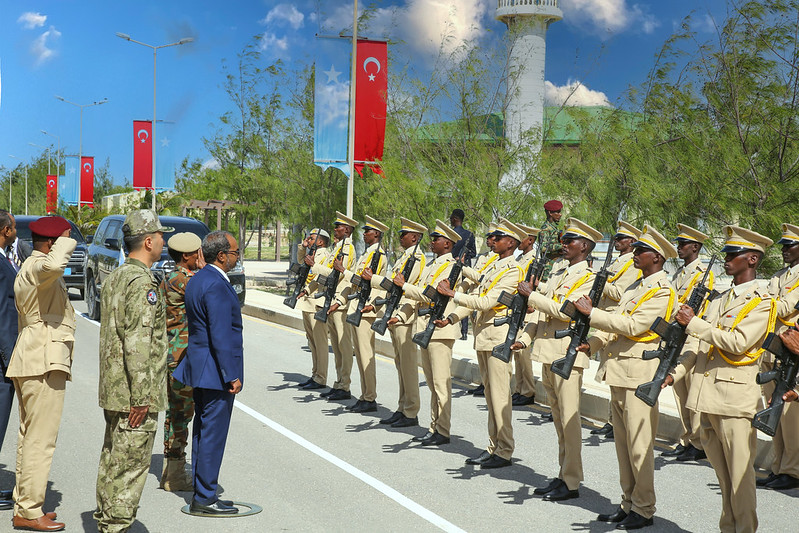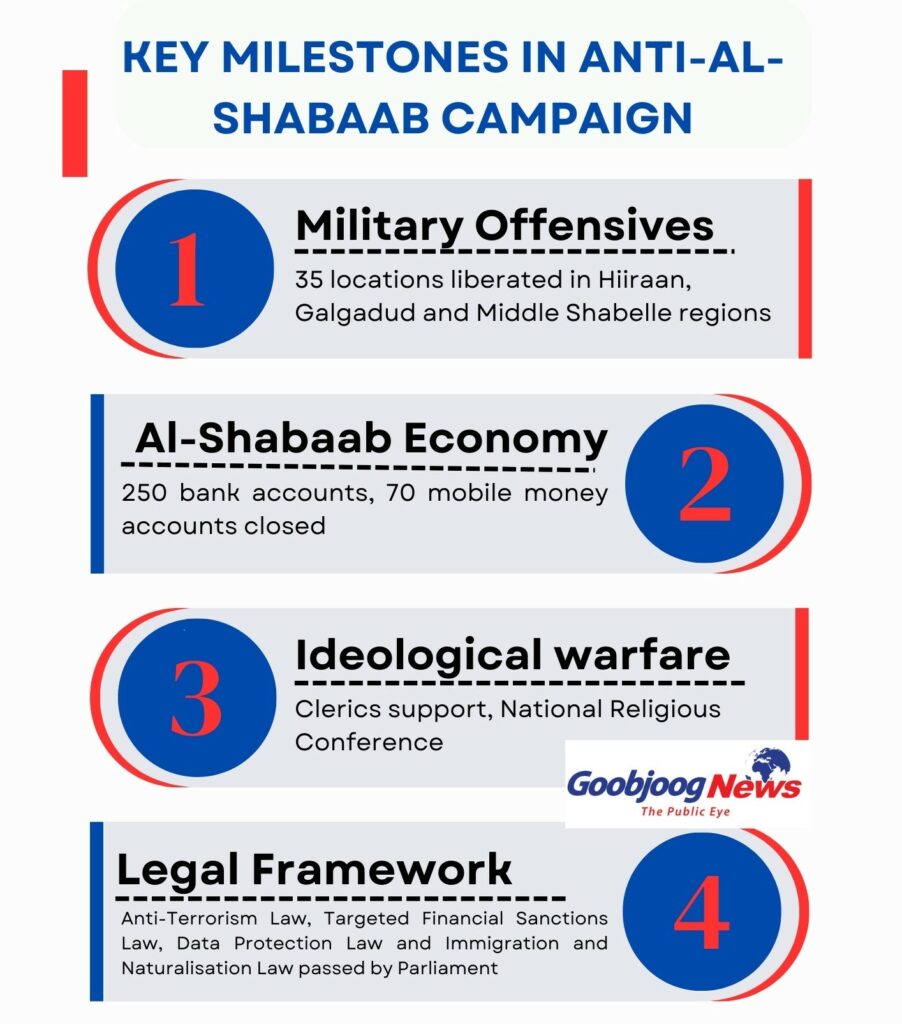SECURITY: Multi-pronged war against Al-Shabaab a major decisive domestic policy

GOOBJOOG NEWS: When President Hassan Sheikh Mohamud came into office in May 2022, security stood out as one of his foremost domestic policy agendas. He argued that Somalia could only progress if there is peace in line with his vision of ‘Somalia at Peace with Itself and with the World.’
In July 2022, the Federal Government launched a multi-pronged operation against Al-Shabaab which brought together the Ministries of Defence, Internal Security, and Interior and Religious Affairs. The operation focused on three fronts namely; military offensives, ideological warfare and financial sanctions.
On the military front, the government took a bold and unprecedented direction which entailed a partnership between the military and the army. Clans in central Somalia, riding on government goodwill and a determination to deal a final blow to Al-Shabaab rose up, provided resources, militia and weapons and joined hands with the military.
The operations which started in the Hiiraan region soon moved to Middle Shabelle and later to the Galgadud regions. To date, the joint operation between the SNA, Ma’awisley militia and state forces has resulted in the capture of at least 35 locations in the three regions according to government records. The government has also said over 2,000 Al-Shabaab militia have since been killed.

According to records from the Office of the Prime Minister, the government has also managed to fully equip four units of the 14 October Brigade of the SNA. Additionally, the government has signed defence cooperation agreements and MOUs with Uganda, the EU, UAE, Sudan and the United States.
On the ideological warfare, the government has robustly engaged with clerics to counter al-Shabaab’s use of Islam as a basis for its indiscriminate killings, indoctrinations and destruction of property. The three days religious leaders’ conference in Mogadishu in January demonstrated that commitment. Clerics from across the country and abroad pledged their support to provide religious guidance, counter Al-Shabaab narratives and challenge the indoctrination of youth by extremist groups.
On the financial front, the government has adopted a multi-faceted approach to ensure it denies Al-Shabaab revenue mobilisation and the flow of illicit finances. In January, the government said it closed 250 bank accounts and 70 mobile money accounts thought to be linked to Al-Shabaab adding that it froze millions of dollars associated with the group. To ensure that it conducts these operations within the law, the government drafted a series of bills and appealed to parliament to expedite the passage of relevant bills.
In the last three months, parliament has passed the Anti-Terrorism Law, Targeted Financial Sanctions Law, Data Protection Law and Immigration and Naturalisation Law. These pieces of legislation are critical in empowering the government to legally and effectively deal with terrorism in different forms.
The government has also invested in internal security infrastructure notable for the refurbishment and upgrade of the Criminal Investigations Department (CID), and the commissioning of the HSJ Center among others.
On 18 March, the National Consultative Council chaired by the President endorsed the revised National Security Architecture which envisages the formation of a 30,000-strong Somali National Army infantry and 40,000 police force to be distributed between the Federal Government and Federal Member States.
Besides local interventions, President Mohamud has also engaged regional countries in trying to develop collaborative approaches to responding to the menace of terrorism. The January Front-Line States Summit which brought together the leaders of Somalia, Kenya, Djibouti and Ethiopia is one such effort.
The regional leaders committed to support the war against Al-Shabaab in their respective countries and deploy additional forces into Somalia outside the ATMIS framework to bolster the ongoing offensives against Al-Shabaab.
The President also successfully facilitated the return of Somali troops training Eritrea and dispatched more recruits for training in Uganda. These efforts have borne fruits and a sustained all-around campaign will see Somalia and the region win the war against Al-Shabaab and other extremist elements in the near future.